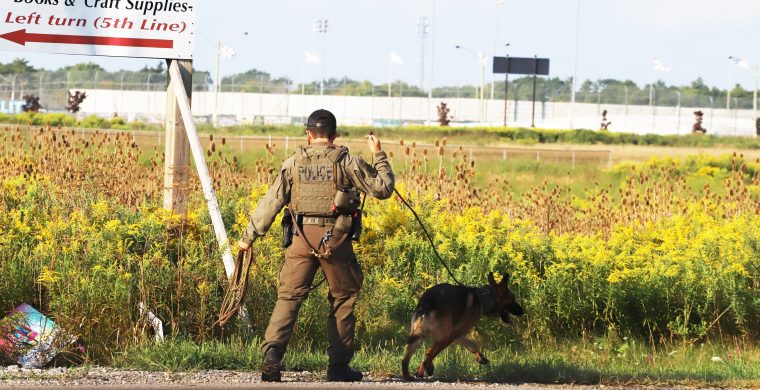Memoir gives voice to Sixties Scoop experience of being raised outside of Indigenous culture
By Shari Narine, Local Journalism Initiative Reporter, Windspeaker.com Children Like Us: A Métis Woman’s Memoir of Family, Identity and Walking Herself Home is Brittany Penner’s account of being adopted as a baby by a Mennonite family in Manitoba and searching for her birth parents. Such an adoption practise—having white families raise Indigenous children—continues, points out Penner, who is now 36 years old. “I really keep thinking about…how many children and teenagers are still facing realities like this where…they have been cut off from their first families, where they’re being raised outside of their culture, and how it’s not something that’s in the past. It is something that is still very present across our country today,” said Penner, who has Anishinaabe, Cree and European settler lineage. When Penner started writing her...
‘We send strength’: James Smith Cree Nation offers condolences to Hollow Water
-CP-Messages of condolences and support poured in for a Manitoba First Nation after a mass stabbing on Thursday, including from a First Nation in Saskatchewan that experienced one of its own exactly three years earlier. Police say eight people were found severely injured in two homes on Hollow Water First Nation, northeast of Winnipeg. An 18-year-old woman died while the suspect, her 26-year-old brother, died after the stolen vehicle he was driving collided with a vehicle driven by a police officer responding to the attack. Police are continuing to investigate the violence that shook the community of about 500 people on the east shore of Lake Winnipeg. The attack took place exactly three years after a mass stabbing on the James Smith Cree Nation in Saskatchewan and the nearby community...
School changing ‘Thunderbirds’ to ‘T-Birds’ to comply with NY ban on Native American team names
By Philip Marcelo BOHEMIA, N.Y. (AP) — A school district in New York City’s suburbs agreed this week to change its “Thunderbirds” nickname to simply the “T-Birds” in order to comply with the state’s mandate to retire all Native American sports names and mascots. According to the deal, Connetquot Central School District on Long Island would be allowed to continue using imagery such as an eagle, thunderbolt or lightning bolt, so long as it can attest the “T-Birds” moniker has “never been associated with any Indigenous imagery of any kind.” But Native American advocates complain the proposed name change still falls short of the spirit of a 2023 state regulation, which districts had to comply with by the end of June. John Kane, a member of the Mohawk tribe of...
Peru considers long-delayed Amazon reserve to protect uncontacted tribes
By Steven Grattan BOGOTA, Colombia (AP) — A commission in Peru was scheduled to vote Thursday on whether to create a long-delayed reserve in a remote stretch of the Amazon that would protect five uncontacted tribes from outside encroachment. The Yavari Mirim Indigenous Reserve, along the Loreto region’s border with Brazil, would include areas where the Matses, Matis, Korubo, Kulina-Pano and Flecheiro — also known as Tavakina – live in voluntary isolation with no sustained contact with the outside world. The groups are highly vulnerable to disease and exploitation. Indigenous communities across Peru’s Amazon also face mounting threats from illegal logging, mining, oil and gas drilling, and drug trafficking. The proposed reserve spans 1.17 million hectares (2.9 million acres), roughly the size of Jamaica. Two decades of discussions The proposal,...
BZA First Nation chief in legal dispute with councillors
By Mike Stimpson, Local Journalism Initiative Reporter, Thunder Bay Source ROCKY BAY — The chief of a Lake Nipigon-area First Nation has taken legal action against the band councillors who suspended her without pay this summer. An affidavit filed in Federal Court alleges that Biinjitiwaabik Zaaging Anishinaabek (BZA) councillors acted unlawfully in July when they suspended Gladys Thompson from the First Nation’s top elected position. In response, a BZA councillor has filed an affidavit asserting that the chief’s suspension was entirely lawful and reflected the will of BZA members. Gladys Thompson’s motion to be reinstated was heard by video conference in Federal Court on Wednesday. Represented by a Winnipeg law firm, she is seeking to be reinstated as “lawfully elected chief” of BZA, formerly known as Rocky Bay First Nation....
Peru considers long-delayed Amazon reserve to protect uncontacted tribes
By Steven Grattan BOGOTA, Colombia (AP) — A commission in Peru was scheduled to vote Thursday on whether to create a long-delayed reserve in a remote stretch of the Amazon that would protect five uncontacted tribes from outside encroachment. The Yavari Mirim Indigenous Reserve, along the Loreto region’s border with Brazil, would include areas where the Matses, Matis, Korubo, Kulina-Pano and Flecheiro — also known as Tavakina – live in voluntary isolation with no sustained contact with the outside world. The groups are highly vulnerable to disease and exploitation. Indigenous communities across Peru’s Amazon also face mounting threats from illegal logging, mining, oil and gas drilling, and drug trafficking. The proposed reserve spans 1.17 million hectares (2.9 million acres), roughly the size of Jamaica. Two decades of discussions The proposal,...
North Shore First Nation passes law aimed at keeping drug dealers out
By Matt Prokopchuk, Local Journalism Initiative Reporter, TBnewswatch.com NETMIZAAGGAMIG — Leadership in a North Shore First Nation says a new law now in force is aimed at keeping “undesirables” — specifically those involved in the drug trade — from becoming established locally. Netmizaaggamig Nishnaabeg, also known as Pic Mobert First Nation, passed a trespassing and safety naaknigewin, or law, on Sept. 2 which is aimed at protecting the community from people involved in the drug trade and those affiliated with gangs, said Thurston Kwissiwa, the First Nation’s deputy chief. “We have gang members coming in and drugs coming into our community,” he said. “Unfortunately, a lot of people have passed away due to drugs.” Kwissiwa said he knows this personally. Two years ago, his son died due to drug use...
Six Nations Police use K9 to search portion of Chiefswood
Six Nations Police and its K9 unit could be seen searching a portion of Chiefswood Road Friday (Sept 5, 2025) morning. (Photos by Jim C. Powless) SIX NATIONS OF THE GRAND RIVER- Six Nations Police (SNP) are searching portions of Chiefswood Road today (Friday Sept., 5, 2025) for a “person in distress.” SNP said there is no threat to the public. SNP did not provide further information but teams of police and police dogs could be seen searching portions of Chiefswood Road at Fifth Line today. Six Nations Fire department assisted. No further information was available....
Suspect in deadly mass stabbing on Manitoba First Nation killed in crash with Mountie
By Steve Lambert and Brittany Hobson A brother and sister are dead and several others injured, including a Mountie, after a mass stabbing Thursday on a small, tight-knit First Nation northeast of Winnipeg. “I ask the community to pray and support one another,” Hollow Water First Nation Chief Larry Barker said at a news conference at RCMP regional headquarters in Winnipeg, his voice halting on occasion. Police said they were still piecing together what happened after the violence erupted early in the morning in the community of about 500 people. RCMP received a call around 3:45 a.m. about an assault, and emergency medical services responded. Two hours later, Mounties got word of a stabbing, said Supt. Rob Lasson. Officers from multiple detachments responded to the First Nation located 200 kilometres...
Officials, Indigenous leaders respond to mass stabbing on Manitoba First Nation
A man killed his sister and wounded several others in a mass stabbing on the Hollow Water First Nation in Manitoba on Thursday. RCMP said Tyrone Simard, 26, then fled in a stolen vehicle and crashed with an officer as she was responding to the attack. Simard died in the crash and the officer was taken to hospital with critical injuries but is expected to recover. Here’s some of the reaction: “To the leadership and to the community members of Hollow Water, our hearts are with you. Our hearts feel very heavy, and we will be there to support you in the ways that are necessary.” — Manitoba Premier Wab Kinew “I ask the community to pray and support one another out there. And my prayers go to the people...
Earthwork exhibit explores Indigenous relationship with the land and those who work to maintain it
By Crystal St.Pierre, Local Journalism Initiative Reporter, Windspeaker.com Earthwork opened Sept. 4 at the Art Museum at the University of Toronto. It is the first major exhibit curated by Mikinaak Migwans, an Anishinaabekwe from Wikwemikong Unceded First Nation. Migwans is curator of Indigenous Contemporary Art at the Art Museum and assistant professor in the Department of Art History at the university. Inspiration for Earthwork came from Migwans’ interpretation of Indigenous beadwork, which refers to a way of working together rather than a singular object. They then reframed the idea into artwork of the land. “Earthwork includes nine Indigenous artists, art collectives or activist collectives, and they’re all thinking about ways that we can think about relating to Earth outside of the idea of resources or material, something more along the...
CP NewsAlert: Mountie injured in crash with suspect after mass stabbing in Manitoba
RCMP say an officer was responding to a mass stabbing on the Hollow River First Nation in Manitoba, when her cruiser crashed with a stolen vehicle driven by the suspect in the attack. Supt. Rob Lasson says the male suspect died at the scene of the crash and the officer was taken to hospital with critical injuries but is expected to recover. An 18-year-old girl was killed in the stabbings and several others were injured....
Accused in jailhouse killing of serial killer Robert Pickton to plead guilty: Crown
The man accused of killing convicted serial killer Robert Pickton in a jailhouse attack intends to plead guilty, the Crown says. Martin Charest is charged with first-degree murder in Pickton’s killing in May 2024 and the Port-Cartier federal penitentiary. Charest allegedly broke a broom handle and shoved it into the face of Pickton, who died in hospital of his injuries days later at the age of 74. A spokeswoman for the Director of Criminal and Penal Prosecutions says during an appearance Wednesday, Charest signalled his intention to plead guilty through his lawyer, but was difficult to hear from behind Plexiglas at a maximum-security prison. The case was postponed until Sept. 25 for Charest to register his guilty plea. Pickton, one of Canada’s most notorious serial killers, was convicted in 2007...
B.C. to contest lawsuit by U.S.-based tribes over consultation rights in Canada
By Chuck Chiang British Columbia’s premier says his government will be fighting a lawsuit by an Aboriginal group based in the United States, saying B.C.’s obligations are to Indigenous people in Canada. David Eby was responding to litigation brought by the Confederated Tribes of the Colville Reservation in Washington state, which says it is being unfairly excluded from B.C.’s consultation with First Nations. In a statement posted online, the Colville Tribes say the group filed suit against B.C. after the province adopted a policy of notifying the group about decisions instead of consulting them. The Colville Tribes say they are part of the Sinixt people and should be treated as an “Aboriginal people of Canada” who were “driven out” of their ancestral lands in B.C. due to Canadian colonialization. The...
Chiefs vote down major projects resolutions, say AFN shouldn’t negotiate for them
By Brittany Hobson First Nations chiefs voted down a resolution at their national assembly on Thursday that opponents said would have amounted to an endorsement of the federal government’s major projects legislation. The resolution would have called on Ottawa to include First Nations infrastructure ventures in its push to fast-track major projects. It also would have allowed the Assembly of First Nations to intervene in lawsuits against the legislation. The resolution failed to obtain the required 60 per cent support at the Assembly of First Nations annual general meeting in Winnipeg. The legislation allows the federal government to fast-track major projects it considers to be in the national interest. Prime Minister Mark Carney insists the bill will not sidestep consultations. First Nations say they were not properly consulted when the...
First Nations educational training service to launch online mental health app for trial run
By Ed Hitchins, Local Journalism Initiative Reporter, Energeticcity.ca FORT ST. JOHN, B.C. — A northeast B.C. Indigenous education service will launch an online application dedicated to mental health for a trial run this week as it prepares for a broader launch. Medicine Wheel Training Services, a firm specializing in First Nations education and mental health initiatives, will launch the application later this week, according to its facilitator Bruce McKay. Formerly the Indigenous relations coordinator at Northern Lights College, McKay has also taught in the Yukon and at Calgary’s Bow Valley College. “What I’ve really tried to do with [Medicine Wheel] is to offer opportunities for people in how to decolonize their teaching practices and classrooms,” said McKay. “Most importantly, how to use a medicine wheel journal that focuses on strength-based...
Saving lives on Vancouver’s Downtown Eastside with Indigenous teachings
By Nora O’Malley, Local Journalism Initiative Reporter, Ha-Shilth-Sa Vancouver, BC – It’s a $10 taxi ride from Vancouver’s Fairmont Waterfront to East Hastings and Main – the epicenter of Canada’s drug poisoning crisis that is disproportionally impacting Indigenous People. At the Aboriginal Front Door Society, kitty corner from historic Carnegie Community Centre and the heart of Downtown Eastside (DTES), hope floats as smoke from a traditional smudging lingers in the room and a team of volunteer outreach workers rallied for a weekly brown bag lunch distribution. Every Wednesday, over 350 souls living on the DTES receive a bologna sandwich, granola bar, fruit cup and juice box. “Food brings us together. It’s part of our teaching,” said James Harry, executive director of the All Nations Outreach Society and a proud Haisla...
Mississaugas of the Credit First Nation Elder Garry Sault passes
MISSISSAUGAS OF THE CREDIT FIRST NATION – The Mississaugas of the Credit First Nation (MCFN) announced today (Sept/. 4, 2025) that well known MCFN Elder Garry Sault passed away September 2, 2025. “It is with profound sadness that the Mississaugas of the Credit First Nation announces the passing of beloved Elder Garry Sault, who departed peacefully on the morning of September 2, 2025,” the statement said. The statement said “Elder Sault was a distinguished Anishinaabe Elder and Knowledge Keeper, a U.S. Navy veteran, and a revered storyteller whose wisdom, warmth, and dedication inspired generations across and beyond the MCFN community.” It spoke of how his deep commitment to cultural education and treaty knowledge made him an “invaluable guide in understanding our shared histories.” Elder Sault was a keeper of treaty...
Five northern Ontario First Nations file human rights complaints over ongoing states of emergency
By Jon Thompson, Local Journalism Initiative Reporter, Ricochet A month after Kitchenuhmaykoosib Inninuwug First Nation declared a state of emergency over lacking health services, its leaders say Ontario’s failure to respond has left them no choice but to take legal action.Chief and council for the fly-in First Nation of 1,500 people declared a state of emergency on July 31, demanding equitable paramedicine resources and Emergency Medical Services, following the poisoning deaths of two local 14-year-olds. The girls were admitted to the nursing station in the morning but medivac wasn’t able to fly them the 600 kilometres south to Thunder Bay until that evening. Their families said doctors told them the deaths could have been prevented with timely care. KI councillor Jacob Ostaman says Ontario has since taken no action, whatsoever....
Chiefs vote down pitch to include First Nations infrastructure in major projects push
By Brittany Hobson First Nations chiefs today voted down a resolution that would have called on Ottawa to include First Nations infrastructure ventures in its national push to fast-track major projects. The resolution, which also would have allowed the Assembly of First Nations to intervene in lawsuits against the federal government’s major projects legislation, failed to obtain the required 60 per cent support at the Assembly of First Nations annual general meeting in Winnipeg. Regina Crowchild of Tsuut’ina First Nation says she voted against the resolution because there’s no guarantee Canada will follow through on its commitment to consult affected communities when it decides which projects to approve. Other chiefs from Alberta say the resolution would have amounted to an endorsement of the federal major projects legislation and could have...







